(SAN DIEGO) — University graduations mark a transition from hard-working student to educated job seeker. Once all the flying hats hit the ground and the sometimes-too-long speeches come to end, the students know it is time to find a job and join the “real world.” I graduated from a community college in San Diego, California, in the summer of 2018. It was one of the most important moments of my life and it drove my passion for learning. That day, when the hats hit the ground and the speeches ended, my grandmother, who was still alive at the time, cupped my face in her hands and told me how proud she was of my success. She wished me good luck as I began my undergraduate career at UC Berkeley.
Graduation ceremonies are, for good reason, emotional affairs. They are one of the only things in life that end with a positive outcome, a promise toward a better future.
But for the class of 2020, that celebration and closure never came.
About two years ago, after the pandemic began, many schools, including Berkeley, canceled their graduation ceremonies. This drastic, if necessary, step will shape some in the class of 2020 for the rest of our lives.
This is the story of my missed graduation and how the pandemic affected my dear friends. Although many graduations did not take place back in 2020, this particular one illustrates loss, confusion, and grief for so many of the UC Berkeley students, feelings that resonate with millions of other college students.
I connected with a few of them by phone and social media.
Lida Li, Sports Journalism Major:
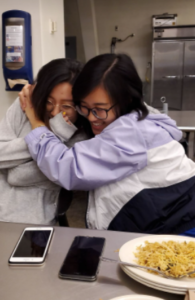
Lida Li hugging one of her best friends, Abby Liu, at a cafeteria in Berkeley, Crossroads. [Courtesy of Lida Li]
When she was 8, Li moved from China to the United States to live with her grandparents. Her parents were absent from Li’s life. She soon found that the formula for success was to show leadership in a social circle and continue pursuing higher education. Li spent many mornings watching the sunrise, her face pressed to a book after pulling an all-nighter.
Li’s acceptance to Berkeley was unsurprising. She has never gotten anything below an A grade. “Although I was considering USC, Berkeley was definitely my top choice,” said Li. She also knew that Berkeley was the school to attend, plan club gatherings, and learn from its award-winning journalism program.
“Apart from my immediate circle of friends, my life was filled with social events in which my signature was to greet everyone with a hug. It was a Lida thing,” said Li. For Li, the hugs were a way to connect with others, to show how she appreciated them and to communicate her feelings.
The pandemic prevented Li from giving her trademark hugs, but it stole so much more.
“Once the pandemic hit, the social aspect of my life ended. Hugs were no longer considered a form of expression but of clear exposure to the virus,” said Li. Instead of hosting in-person club meetings Li hosted Zoom parties.
“COVID truly shaped journalism’s social and communicative world,” said Li.
Li felt confused. A year earlier, she was excited to plan meetings, inviting prominent journalists to the club’s meet and greets. Li bought a beautiful white graduation dress, trimmed with lace, and booked an after-party celebration for her commencement ceremony. But the dress went unworn, the party venue sat empty, and Li felt robbed of the close to her college career.
There was nothing to do but stay indoors, follow the new COVID protocols, and socialize with the outside world through a Zoom camera. Along with Lee, the class of 2020 was ripped from that opportunity, as the pandemic blocked a clear sense of closure to our university years.
Kelley Sheahan, Computer Science Major:
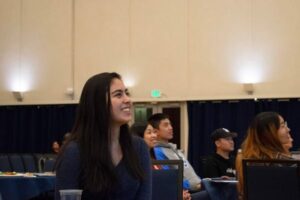
Kelley Sheahan in one of her last classroom lectures at the University of California Berkeley, before the pandemic issued all of the students to take online classes only. [Courtesy of Kelley Sheahan]
Sheahan is originally from San Diego, California, approximately 8 hours away from the Bay Area, where UC Berkeley is located. Berkeley has one of the most unique and impressive computer science programs in the country, so Sheahan knew that it was the school to attend to succeed.
Like Li, Sheahan always delivered straight A’s on her report cards. Once at Berkeley, she did not have family members nearby, so her group of friends quickly became her Berkeley family.
Sheahan spent a lot of time with her friends. They would often eat together at the closest cafeteria to their dorms then pick a nearby indoor lounge to study in.
COVID changed all that.
Like Li, Sheahan is kind and cheerful. She greets people with a warm smile before tentatively asking about your day. It came as no surprise when Sheahan earned the role of a resident assistant, similar to a floor manager, for the Clerk Keer dorms. She was popular among the peers she advised, providing snacks, listening to complaints, and hosting activities so the floormates could meet and spend time with each other.
Like their peers at other schools, RAs at Berkeley play a key role in shaping how a dorm feels for its residents and making the students, who often come from all over the world, feel at home. When a Berkeley student, like Sheahan, moves into their dorm, their entire designated floor is decorated with a specific theme picked by the resident’s assistant, and Sheahan’s floor theme was the Pixar movie “Cars.” Welcome signs adorn the walls. Each door has a name tag for the student, a personalized way to make them feel at home. During holidays such as Christmas, the RAs hold contests for the most creatively decorated door on that floor of the dorm building.
When the first case of COVID-19 emerged, the housing department encouraged Sheahan and many fellow housemates to leave the dorms to keep the virus from spreading. The dorms turned from lively places, filled with energy, to silent halls with empty rooms. It was just too risky to live so close to one another. But moving out of her dorm was not easy for Sheahan. She asked herself, “Where was I to go?”
According to the Public Policy Institute of California, “Prior to the pandemic, about 24% of all undergraduate students, at least 177,000, lived in university [and] most commonly in dormitories.” Many of those 177,000 students had to scramble to arrange alternate housing after they were advised to leave their dorms.
Sheahan was not from the Bay area, she had nowhere to go but her boyfriend Jason’s house. It was difficult for students like Sheahan to navigate the shifting COVID information landscape.
“When we first knew that COVID was spreading, I didn’t fully understand what was happening. I remember a day in March of returning to class as usual on the northside of campus, only for the professor to inform us that the class was canceled. That day would be the last day I ever came to class in person,” Sheahan said.
When the housing department advised every student to move out of their dorms and go back home, “It became a ghost town in the dorm living areas,” Sheahan said to me. Once filled with decorations and flyers advertising in-person dorm activities, the walls now sat bare. The students took their nametags down as they left.
The walls that were once filled with life were now filled with signs that contained information about COVID regulations and reminders to wash your hands thoroughly, wear your mask at all times, and maintain a 6-foot distance from other students.
At the beginning of a crisis such as a pandemic, no one anticipates the complex struggles of others until it happens to them. Sheahan should have been excitedly planning for her graduation day in her last semester at UC Berkeley. Instead of studying for her finals, Sheahan worried about where to live and how to return home. All while she was managing her Zoom classes.
“Once we switched to Zoom classes, I found it difficult to focus because of everything happening, but I relied on guidance from caring teachers and messages from friends and family to keep me motivated until the semester’s end,” said Sheahan.
Zoom classes are challenging for Sheahan. She felt constrained and overwhelmed in the sterile online environment after attending in-person classes her entire life. The hardest part was not spreading her positivity in person with her fellow classmates and saying one last goodbye to her friends.
“I really missed getting together with friends, which used to be my favorite thing about college,” Sheahan said. “Looking back, it feels like COVID created a lot of missed time with Berkeley friends that can never be recreated in the same way.”
Noe Torecilla, Mathematics Major:
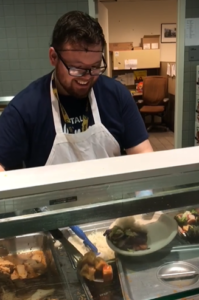
Noe Torecilla, before the pandemic, working at the universities cafeteria, Crossroads, as he always served food with a smile. [Courtesy of Noe Torrecilla]
Torecilla’s immediate family consists of an older brother and a younger sister after his parents passed away when he was very young.
Even though he had a harsh past, Torecilla is upbeat and supportive. His friends compare him to a teddy bear.
“Life has been difficult for me, but I noticed that the more you smile at the world, the more it smiles back at you,” said Torecilla.
In his senior year, Torecilla wanted to explore San Francisco with his friends and looked forward to the blooming conversations and open dialogue he has come to expect from in-person lectures, which suit his auditory learning style.
UC Berkeley lecture halls are massive spaces, with stages and hundreds of seats, almost like an opera house. But in the spring of 2020, those halls sat empty, suddenly replaced with the displays of Zoom video calls, which Torecilla found distracting. “It’s not that I hated online classes,” said Torecilla, “But the sudden need for them was disastrous.”
Like most students, Torecilla was hoping for a brighter ending to his undergraduate year at Berkeley but, “Covid shoved the class of 2020’s college experience, essentially our last semester, into a screen,” said Torecilla.
Camille Uril, English and Literature Major:
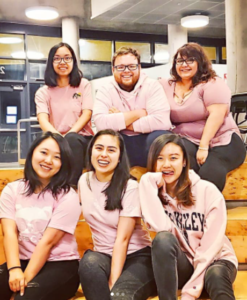
Camille Uril with her UC Berkeley friends, Rio Pang, Kelley Sheahan, Noe Torecilla, Abby Liu, including myself. The photo was taken by another Berkeley student in the Martinez common rooms pre-pandemic when we could all hang out in close spaces without wearing masks. [Courtesy of Camille Uril]
Uril, who is Filipino-American, lights up when she talks about a book. The English major delves into the works of famous authors like “Moby Dick” by Herman Melville. Uril is surprisingly outspoken in her class lectures as she fills the rest of her classmates with her theories on a plot twist or a character’s actions.
Uril has always been keen on her books, never thinking that one day, due to COVID, she would have to trade a physical literature discussion for a Zoom call. “Initially, it was challenging to stay engaged, especially when I had to adjust from being on campus to being at home. I appreciated that my professors were supportive in my classes,” said Uril.
The transition from in-person classes to virtual classes was dreadful. It did not allow Uril to engage with her classmates about literature. Like many other students, she expected to gain extra points or even be heard. Uril was only glad that, “my friends and I kept in touch online despite not being near each other.”
My Perspective:
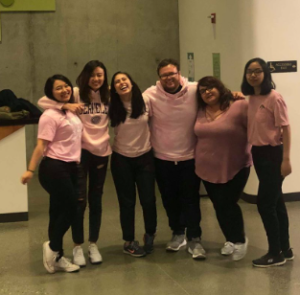
While wearing a mask in a close space and standing 6 feet apart are now seen as mandatory, due to COVID restrictions, this photo represents a Berkeley campus that was free from any regulation. [Courtesy of Shirley Ojeda]
It was my first time away from home and my friend’s support helped push aside my shy personality and made me feel like I belonged.
Once I was off crutches we explored San Francisco’s hidden gems, like the little-known but beautiful Marshall’s Beach. All of that was quickly over with COVID spreading like a wildfire on campus. The next thing I knew, I was packing my suitcase, worried about what would happen next instead of studying for my finals or planning my graduation.
As I placed the last luggage on my father’s Jeep, and looked back at the empty Martinez dormitory building, leaving campus suddenly left me with a burning question, does my Berkeley experience mean anything more than the overpowering memories that were created by COVID?
Two years later, with hindsight, I see that although COVID affected everyone, including my friends in different ways, we all had a resounding theme, we missed out on our opportunity to have closure with a big graduation ceremony.
As I end this story, on a positive note, me and my friends continued to stay in touch even after all the harsh moments created by the pandemic. Finally, after multiple requests by the class of 2020, a whole year later in 2021, UC Berkeley decided, in a smaller scale, to do a mini ceremony where the class, at separately booked times, walked across the stage at the university’s Greek theater as they said our names out loud. It was not the same thing as the previously planned graduation ceremony, but my friends and I agreed, “It was better than nothing.”
COVID changed our lives drastically, but we have to manage to see things from a different perspective, even if they were not as planned.


